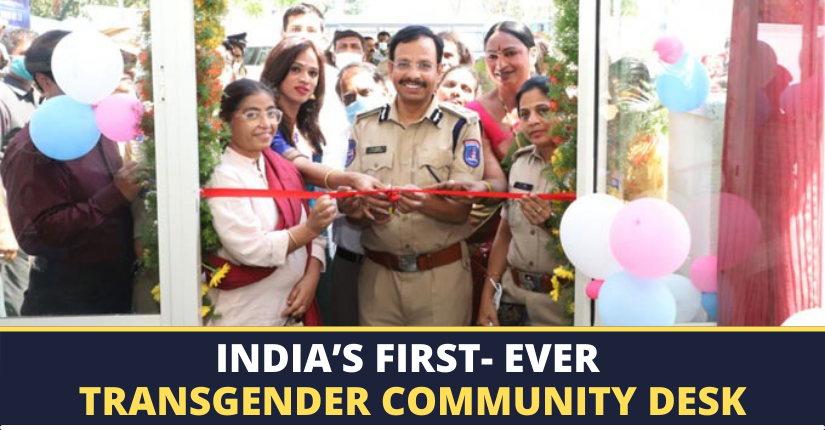
CAN INDIA’S 1st TRANSGENDER COMMUNITY DESK TURN THE TABLE AROUND?
The term transgender encompasses people who have a gender identity or gender expression which differs from their sex assignment at birth (Mondal, Das, Ray, & Banerjee, 2020). The word “hijras” is widely used in the Indian sub-continent to represent intersex, eunuchs, and transgender people. The transgender community even holds a place in Hindu mythology and ancient pieces of literature – Vedas and Puranas. The status of transgender persons started to deteriorate during British rule. The British officials tagged them as “ungovernable”, cross-dressers, beggars, and unnatural prostitutes, and even considered them as a “threat to colonial political authority” (Biswas, 2019).
The increasing discrimination against the transgender community is forcing them to migrate from rural areas to urban areas (Tandon, 2015). Though the state governments and the central government have passed various legislations, the transgender community is still fighting for their basic rights to have a decent life. Their aspiration for better living and social conditions is hindered due to the lack of a good environment to address their issues without fear. Given the discrimination and other issues faced by transgender persons in Hyderabad, the Gachibowli Police Station launched a unique initiative to help them with their current status quo.
The Transgender Community Desk at Gachibowli Police Station
The existing discrimination and violence against the transgender community have surged since the outbreak of the pandemic. The Transgender Community Desk in Hyderabad’s Gachibowli Police Station was inaugurated earlier this March as India’s and the world’s first such initiative and is expected to be a source of immense support for the community in a difficult time like this. The desk was established by the Commissionerate of Cyberabad in a collaboration with Prajwala, an NGO working on the issues of sex trafficking and sex crimes, and Society for Cyberabad Security Council, a not-for-profit collaborative initiative between the IT industry and Cyberabad Police Commissionerate. The community desk will be managed by a police liaison officer and a member of the transgender community, who will be a community coordinator (Pandey, 2021).
The Transgender Community Desk provides different facilities for the community and supports transgender people with filing cases related to discrimination or violence and provides legal aid for them. It also provides services such as skill development, training, job placements, etc. The Desk also refers to welfare schemes in association with the Department of Child and Women’s Welfare and the District Legal Services Authority. Prajwala, furthermore, provides short-stay facilities for transgender persons in need. Being the first such initiative, the Transgender Community Desk is assuredly a breakthrough accomplishment.
Impact of the Desk
The goal of the Desk is to create a better surrounding for the transgender community through creating awareness and other activities. Transgender persons are often afraid to file complaints due to stigma and fear. The initiative is a huge step in breaking the barriers and bringing the community closer to the mainstream of society. Though today many transgender persons are getting educational opportunities, their work-life is still in a quandary. Through skill development and other necessary support for employment, they can become self-sufficient, take up entrepreneurial roles, and provide opportunities for others within their community. Self-help groups of transgender persons show that they are also capable of actively engaging in productive activities.
The notable involvement of MNCs in the Transgender Community Desk can deliver equal employment opportunities for the transgender community. But until the scrapping of Section 377 of the Indian Penal Code, in 2018, which criminalized same-sex relationships, many MNCs used it as an excuse not to hire transgender persons, provide sponsorships, or any other benefits. Section 377 was used as a discriminatory tool to harass and exclude transgender persons from the workforce (Sapam, 2018). Since 2018, there has been more participation of transgender persons in MNCs which makes the sector rethink its existing policies and introduce new trans-specific policies for arising needs and challenges of the transgender community. By giving them equal opportunities and representation, MNCs are not only giving them a stable profession but also challenging the stereotypes and marginalization of the community.
Though transgender persons receive basic support from the government, it is surprising to see the ignorance from the general public and the police against their community. Many have reported being falsely charged or suspected of prostitution by the police. For those who migrate to urban areas in search of employment, the absence of adequate housing facilities could eventually lead to quitting jobs. Incorporating government welfare schemes and assistance from the government authorities can ensure the basic right to safe and secure housing for every trans individual. However, the lack of mainstream participation of transgender persons could be a challenge to the initiative. Due to shame and humiliation, people tend to draw back from society. Along with the active participation of frontline activists, the involvement of other members within the community is essential in bringing other transgender persons to the dominant.
Demography of the Transgender: India and Hyderabad
In the 2011 Census, an option “Others” was given to people who identified as other than male or female, before which transgender was not identified as a gender identity. According to the Census, there is an estimated 4.88 lakh transgender in the country in which 55,000 children are identified as transgender by their parents (Sawant, 2017). Uttar Pradesh has the highest transgender population (1,37,465) in the country. As per the 2011 Census, the transgender population in Hyderabad is roughly around 800. It is said that people were not willing to identify themselves as transgender due to existing social taboos, family pressure, and so on (Sengupta, 2011).
The number has been changing since then. In the electoral roll published before the 2019 general election, the number of transgender voters in the city is 1,504. The number has decreased compared to the previous general election for the reason that more people prefer to identify themselves as either male or female rather than identifying as transgender (Telangana: Number of transgender voters down from 2014, 2019). It was in 1994 when transgender persons were legally granted the right to vote in India. The government has adopted initiatives to provide equal opportunity for transgender persons to vote and contest in elections. However, there are still situations where transgender persons are rejected in contesting elections because of their gender identity.
Present Status of Transgender Persons
In April 2014, the Supreme Court of India passed a landmark judgment recognizing transgender as the third gender in the NALSA (National Legal Services Authority) Vs. the Union of India verdict by upholding any individual’s right to identify their gender. The apex court interpreted fundamental rights mentioned in Articles 14, 15, 16, 19(1)(a) and 21 of the Indian Constitution (NATIONAL LEGAL SERVICES AUTHORITY (NALSA) VS. UNION OF INDIA, n.d.). In the light of the NALSA judgment, the government introduced various bills in the later years to ensure and protect the rights of the transgender community.
In 2014, Rajya Sabha passed the Rights of Transgender Persons Bill to end discrimination against the transgender community. The bill includes provisions such as a National and State Commission for transgender persons, a court for transgender courts, and others. The Rights to Transgender Persons Bill of 2015 is a modified version of the 2014 bill. The bill suggested devising a comprehensive policy to ensure the overall progress of transgender persons. The 2015 bill was criticized for discarding the remedial measures suggested in the previous bill.
The 2016 Transgender Persons (Protection of Rights) Bill completely deviated from the provisions mentioned in the 2014 bill. As per section 4(2) of the bill, one has to face a medical examination of a District Screening Committee comprising of a Chief Medical Officer, a psychiatrist, a social worker, and a member of the transgender community. This completely disputes the right to self-identity of one’s sex and it creates a situation where an individual has to prove their identity. Anti-discrimination was also extended to education, health care, and social security (Abraham, 2017).
The Transgender Persons (Protection of Rights) Bill, 2019 bill defines a transgender person as one whose gender does not match the gender assigned at birth. It prohibits discrimination against transgenders in education, housing, employment, etc. But for a person to recognize themselves as transgender, they would need an identity certificate issued by the District Magistrate. The bill was widely condemned highlighting the provision of identity certificates, absence of reservation in employment and education, and lack of focus on other gender identities like intersex, genderqueer, and transmen (Watch | The Transgender Persons Bill explained, 2019). Thousands of protesters took over the streets and social media platforms showing their disapproval of the bill. While the defenders of the bill said that the Ministry of Law and Justice consulted with various associations on transgender rights and the members of the transgender community, many transgender persons said that they were not consulted on the bill.
Best Practices: Kerala
Intending to make the state more gender-inclusive, the government of Kerala has adopted various schemes in the past to safeguard the rights of transgender persons in the state. The 2011 census data shows that the total transgender population in Kerala is 3,902. Kerala is the first state to establish a school for transgender in India and to introduce Transgender Policy soon after the 2014 NALSA verdict.
The Kochi Metro Rail project, which was flagged off in 2017 appointed transgender persons as its staff as part of the gender-inclusive policy. This is the first such move in India. To end discrimination in employment and education, the Social Justice Department of the government introduced skill development schemes and scholarships for transgender students.
Other schemes include; self-employment assistance, continuing education program, marriage assistance, financial assistance for sex reassignment surgery and further treatment, financial assistance for providing hostel facilities for transgender students, 24×7 helpline, transgender cell, and identity card for transgender persons. The 2016-2017 state budget announced an old-age pension scheme for transgender persons above 60 years old (Kurian & Manoj, 2021). Recently the government launched housing schemes for transgender persons and also announced the inclusion of transgender as a gender option in every government application form.
Way Forward
Seven years since the historic NALSA judgment the government of India and the state governments have adopted various schemes to ensure gender equality. In a similar initiative to the Transgender Community Desk, in 2018, the government of Kerala introduced a 24×7 helpline, which acts as a crisis management center to provide emergency assistance in terms of legal assistance, providing information about their basic rights and counseling for the transgender community.
To strengthen the status of the transgender community, rather than regular policies, transparent and inclusive schemes such as ensuring more education and employment opportunities, legal protection, housing facilities, and accessible health care are substantial. This could increase the frontline participation of the transgender community, even in public decision-making. For creating a society that is more gender-inclusive, sensitizing the general public from grass root level and among public servants, including the police force on the transgender community is indispensable.
The initiative of the Gachibowli police station is an inclusive approach by including both state and non-state actors in breaking the stigma and taboo around the transgender community. Such comprehensive approaches could be pivotal in bridging the gap between the transgender community and society.
